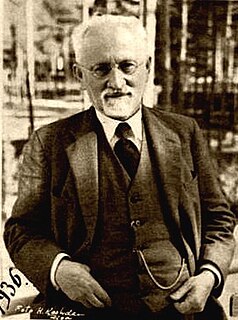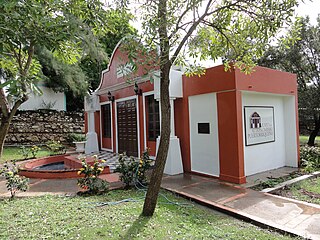The term federalist describes several political beliefs around the world. It may also refer to the concept of parties, whose members or supporters called themselves Federalists.
Regionalism is a political ideology which seeks to increase the political power, influence and/or self-determination of the people of one or more subnational regions. It focuses on the "development of a political or social system based on one or more" regions and/or the national, normative or economic interests of a specific region, group of regions or another subnational entity, gaining strength from or aiming to strengthen the "consciousness of and loyalty to a distinct region with a homogeneous population", similarly to nationalism. More specifically, "regionalism refers to three distinct elements: movements demanding territorial autonomy within unitary states; the organization of the central state on a regional basis for the delivery of its policies including regional development policies; political decentralization and regional autonomy".
Federalism in Quebec is concerned with the support of confederation in regards to the federal union of Canada: that is, support for the specific principles and/or political system specific the government of Canada. This issue has been summarized as revolving around the concepts of Quebec remaining within Canada and opposition to the desires of Quebec sovereigntists.
Workerism is a political theory that emphasizes the importance of or glorifies the working class. Workerism, or operaismo, was of particular significance in Italian left-wing politics.

Jewish Autonomism, not connected to the contemporary political movement autonomism, was a non-Zionist political movement and ideology that emerged in Eastern Europe in the late 19th and early 20th century. One of its first and major proponents was the historian and activist Simon Dubnow. Jewish Autonomism is often referred to as "Dubnovism" or "folkism".

Autonomism, also known as autonomist Marxism and autonomous Marxism, is an anti-capitalist left-wing political and social movement and theory. As a theoretical system, it first emerged in Italy in the 1960s from workerism (operaismo). Later, post-Marxist and anarchist tendencies became significant after influence from the Situationists, the failure of Italian far-left movements in the 1970s, and the emergence of a number of important theorists including Antonio Negri, who had contributed to the 1969 founding of Potere Operaio as well as Mario Tronti, Paolo Virno and Franco "Bifo" Berardi.
Quebec autonomism is a political belief that Quebec should seek to gain more political autonomy as a province, while remaining a part of the Canadian federation. The concept was first articulated by Maurice Duplessis and idea supported by the Quebec nationalist and conservative Union Nationale, Action démocratique du Québec and its successor Coalition Avenir Québec parties which believed in greater provincial autonomy of Quebec without granting independence from Canada. The only parties to support this belief are the Coalition Avenir Québec and Équipe Autonomiste.
Autonomia Operaia was an Italian leftist movement particularly active from 1976 to 1978. It took an important role in the autonomist movement in the 1970s, aside earlier organisations such as Potere Operaio, created after May 1968, and Lotta Continua.
Autonomism is a political doctrine which supports acquiring or preserving political autonomy of a nation or a region. It is not necessarily opposed to federalism, and souverainism necessarily implies autonomism, but not vice versa.
United Jewish Socialist Workers Party was a political party in Poland and Ukraine. Members of the party along with the Poalei Zion participated in the government of Ukraine and condemned the October Revolution in Petrograd proposing a peaceful resolution of political changes in Russia.
The Autonomist Party was an Italian-Dalmatianist political party in the Dalmatian political scene, that existed for around 70 years of the 19th century and until World War I. Its goal was to maintain the autonomy of the Kingdom of Dalmatia within the Austro-Hungarian Empire, as opposed to the unification with the Kingdom of Croatia-Slavonia. The Autonomist Party has been accused of secretly having been a pro-Italian movement due to their defense of the rights of ethnic Italians in Dalmatia. The Autonomist Party did not claim to be an Italian movement, and indicated that it sympathized with a sense of heterogeneity amongst Dalmatians in opposition to ethnic nationalism. In the 1861 elections, the Autonomists won twenty-seven seats in Dalmatia, while Dalmatia's Croatian nationalist movement, the National Party, won only fourteen seats. This number rapidly decreased: already in 1870 autonomists lost their majority in the Diet, while in 1908 they won just 6 out of 43 seats.
The Autonomist Association was a political party in Fiume, that existed continuously from 1896 to 1914. Its goal was to maintain the autonomy of the corpus separatum of Fiume within the Hungarian Kingdom.
The National Question is an expression referring to the discussion about the future status of Quebec within Canada, taking into consideration issues of autonomy, sovereignty, and independence.

The Museo del Autonomismo Puertorriqueño is a small museum in Ponce, Puerto Rico, that showcases the political history of Puerto Rico with an emphasis on the contributions made by the municipality of Ponce and its residents. The museum was established on 7 September 2006.

Dalmatianism, Dalmatianness or Dalmatian nationalism refers to the historical nationalism or patriotism of Dalmatians and Dalmatian culture. There were significant Dalmatian nationalists in the 19th century, but Dalmatian regional nationalism faded in significance over time in favor of ethnic nationalism.
Dalmatian Action was a 1990s regionalist and autonomist party in the region of Dalmatia within Croatia, that advocated for the political autonomy of Dalmatia within Croatia, including the creation of a Dalmatian regional government with a legislative assembly, with autonomy over cultural issues involving Dalmatia. It was founded in December 1990. During the Croatian War of Independence, Croatian President Franjo Tuđman accused the DA of being an anti-Croat separatist organization in league with Serb separatists intent on breaking up Croatia, the DA responded to Tuđman's accusation by denying its validity, saying that it was only interested in autonomy, and said that an autonomous Dalmatia would be a beneficial means to end the Serbian aggression and terrorism of Serbs from self-proclaimed Krajina, as Dalmatian autonomy could insure Dalmatian Serbs' autonomy from the central government in Zagreb, as an alternative to Serb autonomy or independence.



